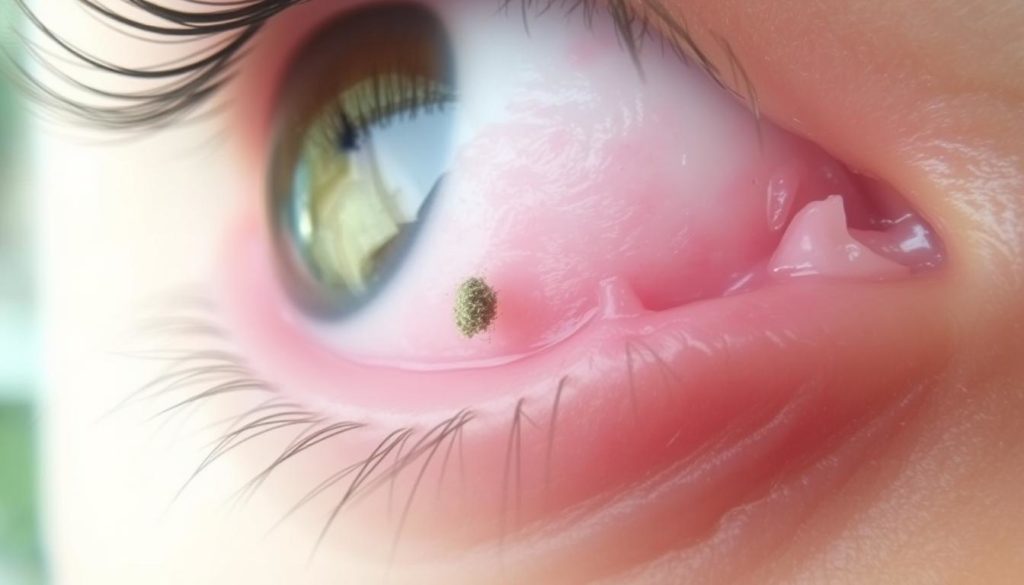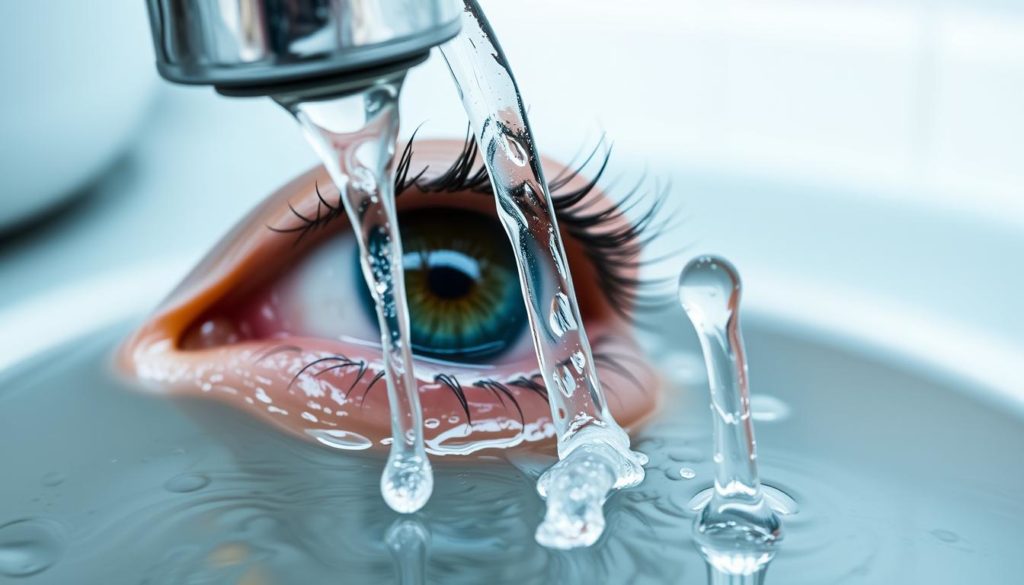Did you know over 2,000 Americans get eye injuries at work every day? This fact shows how common eye problems can be. If you find an eyelash or dirt in your eye, knowing what to do can help a lot.
Having something in your eye hurts and can cause irritation. Your eyes try to flush it out with tears, but this doesn’t always work. It’s important to know how to handle an eye emergency.
Don’t use cotton swabs or rub your eyes without thinking. The right steps can prevent eye damage like corneal abrasions. Keep reading to find out how to deal with eye irritation safely and effectively.
Common Causes of Eye Irritation
Ever wonder why your eyes sometimes feel irritated? There are many reasons why your eyes might get red and itchy. Knowing what causes it can help you feel better.
Eyelashes and Dirt
One big reason for eye irritation is when eyelashes or dirt get into your eye. If something small like an eyelash or a bit of dirt touches your eyeball, it can make you feel uncomfortable and red. It’s important to get rid of these tiny intruders quickly to stop more irritation.
Makeup Particles
Makeup can also cause eye irritation. Sometimes, makeup like mascara, eyeliner, or eyeshadow can smudge or flake off. This can lead to irritation. To avoid this, make sure to apply makeup carefully and clean it off well at the end of the day.

Environmental Factors
The environment can also irritate your eyes. Dust, pollen, or strong winds can easily bother your eyes. These things often make your eyes feel bad, especially when you have allergies or it’s windy. Wearing protective eyewear can help protect your eyes from these irritants.
Initial Steps to Take When You Get Something in Your Eye
When something gets in your eye, it’s key to act fast and carefully. Doing the right things from the start can really help. Here are some important steps to follow:
Don’t Rub Your Eye
It’s natural to want to rub your eyes when they hurt. But don’t do it. Rubbing can make things worse by scratching your eye or pushing the object in deeper. For your eye’s safety, don’t touch or rub your eyes hard.
Wash Your Hands Thoroughly
Before you try to fix the problem, make sure your hands are clean. Wash them well with soap and water to keep out more dirt. Clean hands are crucial in taking care of your eyes. They help prevent infection by keeping out harmful germs.
Locate the Foreign Object
After washing your hands, look for a bright place to find the object in your eye. Check under your eyelids and the eye’s surface carefully. Having someone help you can make it easier to see and remove the object. Knowing how to handle eye irritation right can help you fix the problem fast.

By taking these first steps, you can take good care of your eyes. This can greatly lessen discomfort and prevent more damage.
| Initial Step | Importance |
|---|---|
| Don’t Rub Your Eye | Prevents further irritation and damage. |
| Wash Your Hands Thoroughly | Ensures no additional contaminants enter the eye. |
| Locate the Foreign Object | Assists in quickly addressing the irritation. |
How to Safely Remove Small Objects from the Eye
Having small objects in your eye can be uncomfortable and sometimes painful. Here are some effective methods to manage this situation and ensure your eye health remains optimal.
Flushing with Water or Saline
Flushing your eye with water or a saline solution is a common way to remove objects safely. This method works well if there are multiple particles or if chemicals have gotten in. Using saline for eye irritation helps because it matches the body’s natural moisture, reducing irritation.
Using a Cotton Swab
If you can see the object on the white part of your eye, you might use a cotton swab to remove it. But be careful not to touch the colored part of your eye. This method can be effective for minor irritations.
Blinking Techniques
Blinking is a natural way to help your eye health. If an object gets stuck under your upper eyelid, try pulling your eyelid down over the lower one. Letting tears form and flushing out the object can also work well. Blinking can move the object to a spot easier to remove.
- Use clean, safe water or saline to flush out the eye.
- Employ a cotton swab to carefully remove visible particles.
- Utilize blinking mechanics to naturally shift and remove the object.
What to Do if Something Gets in Your Eye
If you find yourself in an eye emergency, stay calm. Look in every direction to see where the object is. It could be under your eyelids or on the white part of your eye.
Once you’ve found the object, here are some eye care tips for safely removing it:
- Open your eyelids wide with gentle pressure to show where the object is.
- Rinse your eye with water or saline solution to try and flush it out.
- If flushing doesn’t work, use a damp cotton swab to carefully pick up the object.
Having someone help can make this easier, especially if you can’t see the object. If the object is stuck in your eye or if you’re still in pain, get medical help right away.
Here’s what to do:
| Action | Description |
|---|---|
| Locate the Object | Look in all directions to find the foreign object. |
| Flush with Water | Use water or saline solution to rinse your eye gently. |
| Use a Cotton Swab | Carefully pick up the object with a damp cotton swab. |
| Seek Medical Help | If the object is embedded or pain persists, contact a healthcare professional immediately. |
Acting quickly and carefully can help prevent damage from a foreign object in eye.
How Chemicals Can Affect Your Eyes
Household chemicals like bleach, drain cleaners, and detergents can cause serious eye injuries. These items can irritate, burn, or even harm your eyes permanently if not used carefully. It’s important to know how to stay safe around your eyes.
Common Household Chemicals
Many everyday chemicals can be dangerous to your eyes. For instance:
- Bleach: Used for cleaning and disinfecting, bleach can burn your eyes badly if it touches them.
- Drain Cleaners: These products often have lye or sulfuric acid, which can lead to serious injuries.
- Detergents: Laundry and dishwashing detergents can also be harmful, especially if you use too much.
Emergency Actions to Take
If you get a chemical in your eye, act fast. Here’s what you should do:
- Flush the Eyes: Start by rinsing the eye with cool water or a saline solution for 15 minutes. This helps to wash out the chemical.
- Remove Contact Lenses: Remove your contact lenses quickly, but don’t wait to rinse your eyes first.
- Seek Professional Help: Call poison control or see a doctor for advice. If it’s very bad, go to the emergency room right away. Bring the chemical container or label with you to help with treatment.
Learning about the dangers of household chemicals and staying safe can help prevent eye injuries.
Signs You Need to See a Doctor
When you face an eye emergency, some signs show you need quick medical help. Knowing these symptoms means you can act fast and avoid more problems.
Severe Pain and Redness
Feeling severe eye pain with a lot of redness is a big warning. It might mean you have a serious issue like a corneal abrasion or chemical injury. If you see these signs, you should get help from a doctor right away.
Persistent Vision Problems
If you keep having vision problems after trying to remove an irritant, you should see a doctor. Issues like blurry vision or losing sight could mean you have a serious ocular injury. A doctor can help with this.
Embedded Foreign Objects
If something is stuck in your eye or you feel like something is there but can’t see it, call a healthcare provider. Trying to take it out yourself could make things worse. You need to see a doctor to fix this safely. Places like Mount Sinai have the right tools and experts to handle such ocular injuries. They make sure there are no leftover pieces and prevent infections.
Knowing when to get professional help is key to handling an eye emergency well. It helps protect your vision for the future.
Preventing Eye Injuries
Preventing eye injuries means using good eye health practices and wearing the right eye protection. Wearing safety goggles in dangerous places is key. This helps protect against irritation and long-term damage.
Wear Safety Goggles
At construction sites or when cleaning, eye protection is a must. Safety goggles protect your eyes from debris and chemicals. Using them often helps prevent eye injuries.
Avoid Touching Your Eyes
Keep your hands away from your eyes to avoid irritation. This stops harmful substances from getting into your eyes. Good hand hygiene and being careful can boost your eye health.
Proper Eye Care
Good eye care is crucial. Clean your eyes regularly and don’t wear contact lenses too long. These steps prevent injuries and infections. Being clean and aware of your surroundings also helps protect your eyes.
Adding these simple steps to your daily life can lower eye injury risks. Taking care of your eyes now can lead to big benefits later.
How to Help Someone Else Remove an Object from Their Eye
When helping with eye emergencies, cleanliness and caution are key. Begin by washing your hands well before touching the person’s eye. Then, position yourself to gently pull the eyelid away from the eye while the person looks away. This helps you see and find the foreign object.
After finding the object, use clean water or saline to flush it out. This is a good way to remove foreign objects. Always be gentle to avoid making things worse.
When helping with eye irritations in kids, be extra careful. They might rub their eyes, which can make things worse. A steady hand and calm approach are crucial in these situations.
If you can’t remove the object or if the person is in a lot of pain, get medical help right away. Quick action is key to preventing more problems and getting the right care.
What Not to Do When You Have Something in Your Eye
When something gets in your eye, it’s crucial to know what not to do. Making the wrong moves can lead to serious eye problems. It’s key to avoid certain actions for your eye health.
Avoid Using Sharp Objects
Don’t try to remove the object with sharp things like tweezers or pins. This can cause more harm to your eye’s delicate parts.
Don’t Delay Medical Treatment
Waiting too long to get medical help can cause lasting eye damage. If you’re still feeling pain, seeing less clearly, or think something like metal is stuck, get help right away from a doctor.
Avoid Rubbing the Eye Vigorously
Rubbing your eye hard might seem like a natural reaction, but it’s not a good idea. It can lead to eye injuries, make the problem worse, or even keep you from healing properly.
| Wrong Actions | Potential Consequences |
|---|---|
| Using Sharp Objects | Increased Risk of Eye Injury |
| Delaying Medical Care | Permanent Vision Damage |
| Rubbing Eye Vigorously | Corneal Abrasions and Embedded Objects |
Understanding Corneal Abrasions
Corneal abrasions are scratches on the eye’s surface. They can happen from minor accidents or foreign objects. These scratches can be very painful and cause discomfort.
Symptoms of Corneal Abrasions
People with corneal abrasions often feel constant pain, tear up, and are sensitive to light. Other signs include redness, a gritty feeling, and blurry vision. It’s important to notice these symptoms and get medical help quickly to avoid more problems.
Treatment Options
Eye abrasion treatment starts with a doctor’s check-up. Doctors may use antibiotic ointment to fight infection and help healing. Sometimes, wearing an eye patch is advised to protect the eye and aid in recovery.
Watch for infection signs, especially if pain and irritation don’t go away. If you’re still in pain after a few days, get medical help. This ensures you get the right eye abrasion treatment and heal properly.
Natural Recovery from Minor Eye Irritations
Minor eye irritations usually go away in a few hours or overnight. This is thanks to the eye’s natural defenses like tearing. These defenses help to get rid of irritants. It’s important to know that the eye has its own ways to heal itself for minor issues.
If the discomfort doesn’t go away, you can try over-the-counter artificial tears or lubricants. These products can make your eyes feel better and help them heal faster. But if the irritation lasts more than one or two days, you should see an eye care professional.
If irritations keep happening, it could mean there’s a bigger problem. A professional can check for any foreign bodies or injuries that might be slowing down healing. It’s also key to keep your eyes clean and avoid things that irritate them to help them heal naturally.
FAQ
What should you do if you get something in your eye?
If something gets in your eye, don’t rub it. Wash your hands well first. Then, try to flush your eye with water or saline solution. If the object is still there, use a moist cotton swab to remove it carefully or ask for help.
What are common causes of eye irritation?
Things like eyelashes, dirt, makeup, and environmental factors like dust, wind, or pollen can irritate your eyes.
What are the initial steps to take when something gets in your eye?
First, don’t rub your eye. Clean your hands well to avoid spreading germs. Look for the object in your eye in a bright area.
How can you safely remove small objects from the eye?
To remove small objects, flush your eye with water or saline solution. Use a cotton swab to carefully remove particles. Blinking can also help dislodge the object.
What actions should be taken if chemicals get into your eye?
If chemicals like bleach or detergent get in your eye, rinse it with cool water or saline solution for 15 minutes. Take out your contact lenses and get advice from poison control or a doctor.
What are the signs that you need to see a doctor for an eye issue?
See a doctor if you have severe pain and redness, ongoing vision problems, or if an object is stuck in your eye. Get immediate medical help if you feel something is in your eye but can’t see it.
How can you prevent eye injuries?
To prevent eye injuries, wear safety goggles in dangerous places. Don’t touch your eyes with dirty hands. Keep your eyes clean by following proper care routines.
How can you help someone else remove an object from their eye?
Help someone with an object in their eye by washing your hands well. Open their eyelid to find the object. Flush it out with water if you can. Be very careful when helping children.
What should you avoid doing when you have something in your eye?
Don’t use sharp objects, wait too long to get medical help, or rub your eye hard. These actions can make eye damage worse.
What are the symptoms and treatment options for corneal abrasions?
Corneal abrasions cause ongoing pain, tearing, and sensitivity to light. Doctors can treat it with antibiotic ointment and sometimes an eye patch for protection.
How does the eye naturally recover from minor irritations?
Minor eye irritations usually heal in a few hours or overnight. Using artificial tears and good eye hygiene helps. If irritation lasts more than a couple of days, see an eye doctor.


